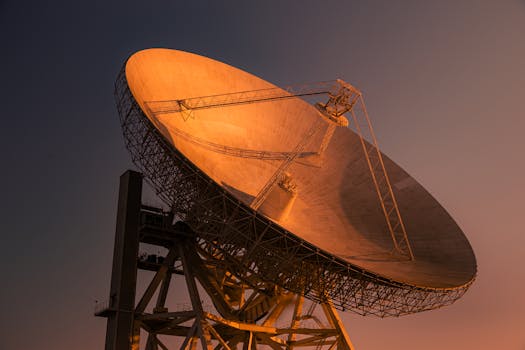Connecting the Globe: The Impact of Orbital Technology on Global Communication

Orbital Technology has become a crucial component of modern global communication, enabling the transfer of vast amounts of data across the globe in a matter of seconds. Orbital Technology refers to the use of satellites and other space-based systems to facilitate communication between different parts of the world. The impact of Orbital Technology on global communication has been significant, and it continues to shape the way we communicate and interact with each other.
The use of Orbital Technology in global communication has several benefits. Firstly, it enables the transfer of data over long distances, making it possible to communicate with people in remote or hard-to-reach areas. Secondly, it provides a high level of reliability and security, as data transmitted through satellites is less prone to interference and hacking. Finally, Orbital Technology has enabled the development of new communication services, such as satellite broadband and satellite-based navigation systems.
The history of Orbital Technology dates back to the 1960s, when the first commercial communications satellite was launched. Since then, the technology has evolved rapidly, with significant advancements in areas such as satellite design, launch systems, and signal processing. Today, there are thousands of satellites in orbit around the Earth, providing a wide range of communication services, including television broadcasting, telecommunications, and navigation.
The Benefits of Orbital Technology
Orbital Technology has several benefits that make it an essential component of modern global communication. One of the primary advantages of Orbital Technology is its ability to provide global coverage, enabling communication between different parts of the world, regardless of geographical location. This has been particularly important for areas with limited or no access to traditional communication infrastructure, such as remote or developing regions.
Another significant benefit of Orbital Technology is its reliability and security. Data transmitted through satellites is less prone to interference and hacking, making it a secure means of communication. This has been particularly important for industries such as finance and government, where secure communication is critical.
Orbital Technology has also enabled the development of new communication services, such as satellite broadband and satellite-based navigation systems. These services have revolutionized the way we communicate and interact with each other, enabling rapid and reliable data transfer across the globe.
Future Developments in Orbital Technology
Despite the significant advancements that have been made in Orbital Technology, there are still several challenges that need to be addressed. One of the primary challenges is the increasing congestion of the Earth’s orbit, which has led to concerns about the long-term sustainability of the technology. To address this challenge, researchers are exploring new technologies, such as satellite constellations and quantum communication systems.
Another area of research is the development of new materials and designs for satellites, which could enable the creation of smaller, more efficient, and more cost-effective satellites. This could make it possible to launch more satellites into orbit, increasing the capacity and reliability of global communication systems.
The use of artificial intelligence and machine learning is also being explored in the context of Orbital Technology. These technologies could enable the development of more sophisticated signal processing systems, which could improve the efficiency and reliability of data transfer. Additionally, they could enable the creation of more autonomous satellites, which could operate independently and make decisions in real-time.
Conclusion
In conclusion, Orbital Technology has had a profound impact on global communication, enabling rapid and reliable data transfer across the globe. The benefits of Orbital Technology, including its ability to provide global coverage, reliability, and security, make it an essential component of modern communication systems. As the technology continues to evolve, we can expect to see significant advancements in areas such as satellite design, launch systems, and signal processing. With the increasing importance of global communication, Orbital Technology is likely to play an even more critical role in shaping the way we communicate and interact with each other in the future.




